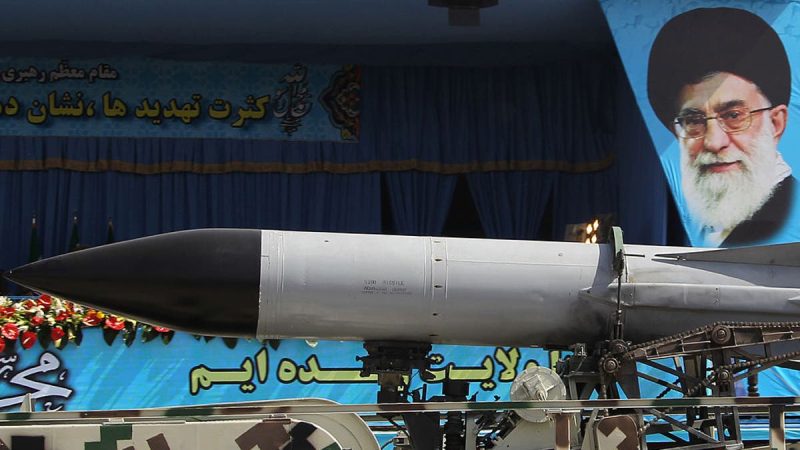‘Right down the line’: Medicaid reform in ‘big, beautiful bill’ divides lawmakers by party
US sanctions money laundering network aiding Iran as regime faces nuclear reprimand at IAEA

The Department of the Treasury’s Office of Foreign Assets Control (OFAC) sanctioned some 35 individuals involved in laundering money for Iran on Friday as the administration seeks to make a deal with Iran over its nuclear weapons program.
A State Department spokesperson said in a statement that,’This network has laundered billions of dollars through Iranian exchange houses and foreign front companies to sustain Tehran’s campaigns of terror that undermine international peace and security and line the pockets of regime elites.’
Meanwhile, tensions with Iran continue, with the Associated Press reporting that Western powers are considering a resolution at the IAEA that would formally declare Tehran in non-compliance with its nuclear obligations.
Iranian Foreign Minister Abbas Araghchi called the move a ‘strategic mistake’ and accused the U.K., France, and Germany of choosing ‘malign action’ over diplomacy. ‘Mark my words as Europe ponders another major strategic mistake: Iran will react strongly against any violation of its rights,’ he wrote on X.
The draft resolution, expected to be introduced next week, would mark the first time in two decades that Western nations bring such a motion against Iran at the IAEA.
As U.S. and Iranian negotiators engage in fragile talks, voices from within Iran reveal a grim paradox: while many citizens desperately seek relief from crushing economic hardship, they fear any deal may only tighten the Islamic Republic’s grip on power.
‘Right now, people in Iran do not have any hope for anything,’ said a female journalist in Tehran, who spoke anonymously out of fear for her safety. ‘The economy is collapsing. We sometimes don’t have electricity or water. The value of the rial is falling. Life is becoming unlivable.’
Like many Iranians, she believes an agreement could temporarily ease inflation and halt the country’s economic freefall. But she—and many others—fear the unintended consequences. ‘If the regime reaches a deal, it could become more powerful and more confident in suppressing people. That’s what frightens us the most,’ she said.
Under Supreme Leader Ayatollah Ali Khamenei, Iran has faced growing unrest at home, triggered by economic pain, political repression, and widespread mistrust. As negotiations proceed, Iranian citizens are watching closely—but not with optimism.
‘People in Iran are caught in a dilemma,’ said another Tehran resident, a man who also requested anonymity. ‘On one hand, they want the regime to fall. On the other, the economic burden is so heavy that any deal offering relief feels like a lifeline. But the truth is, even if a deal is signed, ordinary people won’t benefit. We’ve seen this before.’
He pointed to the 2015 Joint Comprehensive Plan of Action (JCPOA), the Obama-era nuclear agreement that promised economic benefits but, according to many Iranians, never delivered meaningful change for the public. ‘Only those connected to the regime gained anything,’ he said. ‘For the rest of us, life stayed the same.’
While Iranian leaders claim the nuclear program is peaceful, the U.S. and allies remain concerned about uranium enrichment levels nearing weapons-grade levels. Trump has demanded a full halt to enrichment, while Khamenei insists on retaining it.
‘I’m a journalist, and we work under extreme censorship,’ said the woman in Tehran. ‘We’re not allowed to mention U.S. or Israeli military capabilities. We can’t publish anything about the talks without approval.’
She described a system where state censors dictate what reporters can and cannot say—down to the vocabulary. ‘It’s not just the content—it’s the individual words. And that makes journalism almost impossible.’
In the interviews with Fox News Digital, Iranians expressed deep skepticism that Khamenei would abide by any agreement. ‘He lies,’ the journalist said bluntly. ‘What he says publicly is never what he actually does. He manipulates both the public and foreign governments. No one should trust a dictator like him.’
The man echoed the sentiment. ‘The regime’s survival depends on its hostility toward the U.S. and Israel. If it truly committed to a deal, it would undermine its own ideological foundation. That’s why no one believes it can last.’
Recent months have seen a resurgence of protest activity in Iran, including a growing nationwide strike by truck drivers demanding fair wages and lower fuel prices. Though largely ignored by international media, these strikes follow years of widespread protests—most notably the 2022 ‘Woman, Life, Freedom’ uprising sparked by the death of Mahsa Amini in morality police custody.
That movement, along with economic demonstrations in 2019 and 2021, was met with violent crackdowns, mass arrests, and internet blackouts. The pattern has left Iranians wary that any sign of instability is met with brutal suppression.
An Iranian student pointed to the truckers’ strikes currently roiling parts of Iran as a sign of grassroots unrest. ‘These strikes are a direct message from the people,’ he said. ‘They’ve been largely ignored by the media, but they are powerful and legitimate. This is how change begins—if it’s allowed to.’
The Associated Press contributed to this report.







